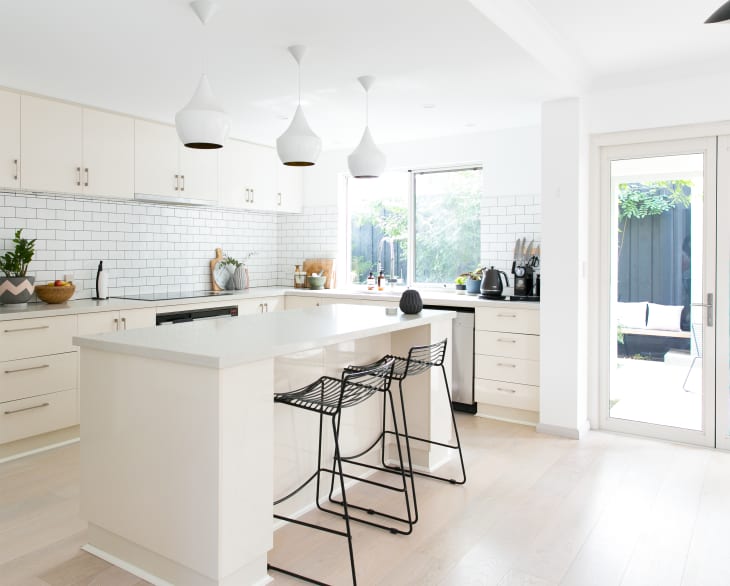10 Things You Didn’t Know About Quartz Countertops

With all the different countertops out there, picking the right material for your kitchen is tricky and finding the right info about each option can be tough. You’ve probably heard of quartz, or engineered stone, by now—it’s the most popular countertop around after all—but here are 10 very handy things you might not know about the material.
1. You Can’t Set Hot Pans on Them
Although quartz countertops are extremely durable and considered heat-resistant, putting a hot pan right on the surface can damage the material. As with most other countertops, you’ll need to use a trivet or stove mitt to protect it, as heat can cause discoloration and/or cracking.
2. They Aren’t Actually All Quartz
These man-made countertops are actually a blend of ground up quartz (although some engineered stone includes other random stone aggregate and materials), which are ground down and blended with a resin or polymer binder. A little bit of pigment is thrown in for color and pattern. It’s the high composition of hard mineral quartz that makes this material so strong, however.
3. It’s Not the Same as Quartzite
Don’t confuse quartz countertops with quartzite, which is a totally natural material that’s quarried like granite and marble. Each piece of quartzite has unique color variations and patterned veining. Although it is very durable, quartzite is a porous material, which means it also needs to be periodically sealed to prevent stains. Quartz countertops are non-porous and don’t ever need to be sealed.
4. They Aren’t DIY-Friendly
If you are the handy sort, you can probably envision installing butcher block or laminate countertops yourself. Quartz countertops, on the other hand, are a different beast. Most companies deal only with certified installers, so it may be hard to get your hands on a slab. Even if you do, these countertops are on the heavy side and require a wet saw with diamond blade to cut, which might turn off most DIYers.
5. You Can Save Money With Remnants
Quartz countertops are one of the more expensive options out there, but you can save money by searching for remnants. Since they are manufactured in slabs, then cut to each job’s specifications, excess pieces are the inevitable result, so it’s worth checking your local stone yard for any pieces you can find. While quartz countertops usually cost roughly between $60 and $120 per square foot installed, you might be able to knock a substantial amount off that figure by using someone else’s leftovers.
6. They’re More Popular Than Granite
For years, it was granite, granite, granite. But, as we wrote about earlier, quartz is the new contender, and has now surpassed granite in sales. It’s now the most popular choice out there.
7. They Are Strong, But They Can Chip
Quartz countertops are known for their durability, but no material is perfect 100 percent of the time. You only need to read the comments on this post to learn that quartz countertops can and will chip on occasion. Like most countertops, edges are most vulnerable, especially around sinks where they are most likely to get banged by heavy pots and pans.
8. There are Size Limits
Quartz countertops are only as large as the machines that produce them, and there are limitations. The average slab is 56″ x 120″, although some companies are now making jumbo sizes (Cambria, for instance, makes one that measures 63″ x 130″). Depending on the size of your countertop, or if you have your heart set on a huge island, know that seams are probably in your future.
9. Multiple Finishes are Available
One complaint we often hear about quartz countertops is that they come off as ultra-sleek or too modern, which leaves kitchens feeling cold. One way to combat the sterility is to forgo the polished finish. Manufacturers have listened to customers and now offer matte, sueded and honed finishes, for starters, which have a softer, less glossy appearance. You can also now find versions that mimic other textured substances—things like leather, volcanic, and concrete—each of which has their own look and feel.
10. Pantone Matching is Possible
If you can dream it, quartz countertop manufacturers can make it happen. Because these countertops are made in a factory, they can be customized in any color you please. White and gray are the most popular choices, without question, but endless colors are available. So if millennial pink is your jam, it’s all possible.
More About Countertops:
- The Most Popular Kitchen Countertop Is No Longer Granite
- Here’s Exactly Why Quartz Countertops Are Winning Right Now
